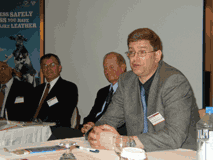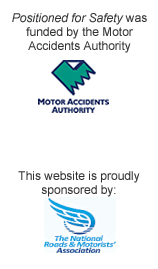News, research & events
Staysafe Review of Vulnerable Road Users
The NSW Parliamentary Joint Standing Committee on Road Safety (Staysafe) has commenced an inquiry into vulnerable road users. The inquiry will focus on motorcycle and bicycle safety and look specifically at: trends in injuries and fatalities, including underlying causes of such incidents; current measures and future strategies to address the safety of these road users; consideration of the needs of motorcyclists and bicyclist during the planning and management of the road system; and vulnerable road user safety issues and strategies in other jurisdictions.
The inquiry is being conducted against a sustained increase in motorcycle fatalities and serious injuries on NSW roads. A recent Australian Government report dealing with motorcycle safety indicated that motorcycles, while representing 4.5% of registered vehicles, accounted for 15% of road deaths and an even higher proportion of roadrelated serious injuries.
» Call for submissions: 23 Jun 2010
» Submissions close: 6 Aug 2010
Inquiry Terms of Reference
That the Committee inquire into and report on vulnerable road users, specifically motorcycle and bicycle safety, with particular reference to:
a) patterns of motorcycle and bicycle usage in New South Wales;
b) short and long term trends in motorcycle and bicycle injuries and fatalities across a range of settings, including on-road and off-road uses;
c) underlying factors in motorcycle and bicycle injuries and fatalities;
d) current measures and future strategies to address motorcycle and bicycle safety, including education, training and assessment programs;
e) the integration of motorcyclists and bicyclists in the planning and management of the road system in NSW;
f) motorcycle and bicycle safety issues and strategies in other jurisdictions; and
g) any other related matters.
Link to StaySafe Committee webpage
Barriers to change: designing safe roads for motorcyclists
EuroRAP (European Road Assessment Program) has released a position paper on motorcycles and crash barriers. EuroRAP is an association of motoring organisations and road authorities, which has established a system to measure the safety of roads. The position paper is the result of a two year review of available evidence and debate on the issues of motorcyclists and safety barriers. The EuroRAP Motorcycle Safety Review Panel concluded that, while crash barriers save the lives of car occupants, they can be killers of motorcyclists. They found that riders are 15 times more likely to be killed than car occupants in an impact with a crash barrier. They also found that crash barriers can, and should, be designed to be less damaging to riders. Their report contains a number of recommendations. Barriers to change
ACEM European Motorcycle Safety Plan for Action
Building on the findings of the MAIDS study, the motorcycle industry association in Europe has developed a safety plan with a focus on Improving Knowledge, Human Factors, Vehicles and Infrastructure.
Motorcycle and Scooter Safety Summit: The Road Ahead, Canberra, April 10-11, 2008
The summit brought together motorcyclists and road safety professionals to explore key motorcycle and scooter safety issues and identify scope for improving existing safety measures and developing new measures. Speakers included experts from Europe and the USA. The outcomes will provide input to national road safety strategy based on practical, evidence-based recommendations for actions to improve motorcycle safety.
The Summit was sponsored by the Department of Infrastructure, Transport, Regional Development and Local Government and the Federal Chamber of Automotive Industries (FCAI). It was an initiative of the Motorcycle Safety Consultative Committee whose members represent rider groups from each State and Territory.
The Gear Study, ACT
A study of protective clothing and injuries in motorcycle crashes is being conducted in the ACT over a 12 month period. The study is unique in involving injured and uninjured riders who have been in a road crash. Injured riders are recruited through hospitals and the non-injured through crash repair services and through the motorcycle community. The study is supported by the Australian Motorcycle Council, the ACT Motorcycle Riders Association and the Motorcycle Council of NSW. For further information email: Gear study
The study aims to provide riders with information about the gear they wear. It will also provide valuable feedback to the motorcycle clothing industry about their products. The study is a joint project between The George Institute for International Health and Canberra Hospital. It is funded by Swann Insurance.
Australasian College of Road Safety (ACRS) Motorcycle Safety: Improving the Odds, November 1 2007
The Australasian College of Road Safety held a seminar in recognition of Motorcycle Awareness Week for an audience that included representatives from road authorities, local government and the insurance industry. Speakers Jim Ouellet, Fred Schnerring and Liz de Rome explored some of the myths and misconceptions about motorcycles crashes. Jim Ouellet will be a familiar name to many as one of the authors of the Hurt Report, which was the original large scale in-depth study of motorcycle crashes in the USA. He now teaches motorcycle crash investigation, reconstruction and injury analysis. Fred Schnerring is a consultant engineer and expert motorcycle crash investigator. Liz is a research consultant who specialises in motorcycle safety issues. The seminar was chaired by Guy Stanford, Chairman of the Motorcycle Council of NSW and hosted by The George Institute for International Health.
US National Transportation Safety Board (NTSB), Motorcycle Safety Forum - September 2006, Washington
MCC consultant, Liz de Rome was invited to be a part of a Technical Panel presenting to the National Transportation Safety Board (NTSB). Her paper on The injury reduction benefits of motorcycle protective clothing, was one of only two invited from outside of the US at the two day forum.
2006 International Motorcycle Safety Conference: The Human Element, USA, March 2006
Liz de Rome & Guy Stanford presented a paper Motorcycle protective clothing: Fashion or function? at the 2006 International Motorcycle Safety Conference: The Human Element (IMSC), Motorcycle Safety Foundation, March 28-30, Long Beach.
Motorcycle Council (MCC) Gearing Up - Motorcycle Protective Clothing - May 2005
The MCC held a seminar for the motorcycle clothing industry to raise awareness and discuss issues of protective clothing standards and consumer protection. May 4, 2005.

The seminar followed earlier research for a guide to protective clothing, which revealed that many of the products currently available may not deliver the level of protection that is promised.
The aim of the seminar was to discuss options for ensuring that motorcycle protective clothing sold in Australia is fit for purpose. Participants included manufacturers, importers and retailers as well as motorcycle industry, media and community representatives. For a full report see link Gearing Up - Motorcycle Industry Seminar Report
The Touring the Illawarra Motorcycle Safety and Tourism Project
This is a joint initiative of the Local Government Road Safety Program and Tourism NSW to address motorcycle crashes in the Illawarra. Research by the NSW Injury Risk Management Centre (IRMC) indicated that a large proportion of motorcycle crashes occurring in the area were visiting 'day-riders', with fatigue and excessive speed being significant factors. The IRMC Report is available in Publications, also see Rider fatigue
The Touring the Illawarra booklet was developed using local rider knowledge and included the best loved routes and relevant road safety information. It encourages riders to take a break and identifies local cafes and other hospitality businesses that are motorcycle friendly. Note: the booklet will be available to be downloaded from this site shortly.
Australasian College of Road Safety (ACRS) Motorcycle Safety Seminar, December, 3 2004
In another first, the ACRS held a seminar on motorcycle safety. Presenters included Brian Wood, who gave a presentation on the benefits of the MCC having developed the Motorcycle Safety Strategy (Positioned for Safety) and the achievements that have occured as a result.
Other speakers included Prof Radin Umar from Malaysia who spoke about the types of engineering treatments being pioneered in Malaysia to make road designs more motorcycle friendly in a country where motorcycles make up 49% of registered vehicles. Treatments include motorcycle only lanes and special lane markings at intersections.
2004 Road Safety Research, Policing & Education Conference, 14-16 November
This was the first time that an entire session has been devoted to motorcycle safety issues at this annual national conference. Two of the papers involved work by the MCC.
- Survive the Ride II - Working from the ground up a description of a program run by Auburn, Blacktown, Parramatta and Canada Bay Councils.
- Survey of Motorcyclists and their safety initiatives a report by Liz de Rome on a survey conducted by the MCC in 2001. (Copies available in Publications)
The third paper, Hazard perception and responding in car drivers and motorcyclists, was a report by Christine Mulvihill from the Monash University Accident Research Centre. It was a study of the differences in hazard perception and responding skills needed by novice riders and drivers. All papers from this and previous years conferences can be downloaded from the Road Safety Conference web site.
-
MCC Industry seminar on motorcycle protective clothing - 4th May 2005
Introduction The Gearing Up seminar was held by the MCC for the motorcycle protective clothing industry. Speakers included representatives of the Australian Consumers Association, ACCC, Clayton Utz,...
-
UK Motorcycle Strategy
The UK government was the first national government to commit to broad based motorcycling strategy (February 2005). It is essentiall a transport strategy, which covers environmental, infrastructure...

